If you’re reading this, you’re probably wondering about THCA and how long it hangs around in your body. Well, you’ve come to the right place. Let’s break it down together, shall we?
Before we dive into the nitty-gritty of THCA retention, let’s make sure we’re all on the same page about what THCA actually is.
Now, you might be wondering, “If it doesn’t get me high, why should I care about THCA?”
Well, THCA has its own bag of tricks.
While THC is known for its psychoactive effects, THCA is being studied for potential therapeutic benefits. It’s like comparing apples and oranges – both fruits, but with very different flavors.
Alright, let’s get to the million-dollar question: how long does THCA stick around?
The answer isn’t one-size-fits-all. It’s more like a “choose your own adventure” book, where multiple factors come into play.
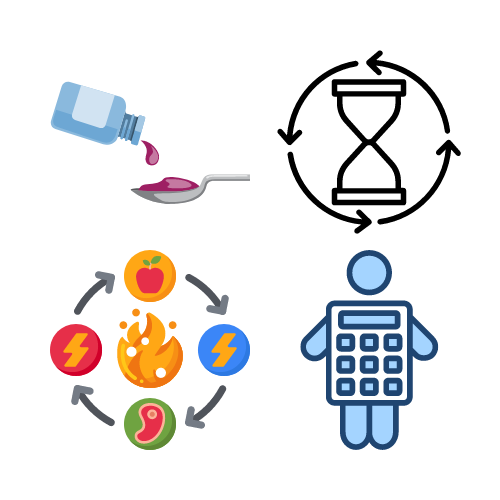
It’s like baking a cake. The ingredients (factors) all interact to create the final product (how long THCA stays in your system).
On average, THCA can be detected in your system for about:
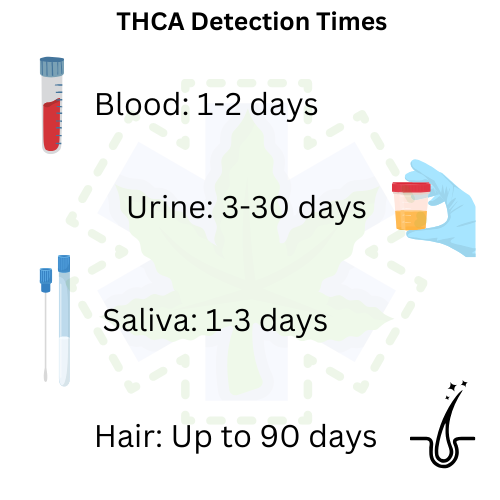
But remember, these are just ballpark figures. Your mileage may vary.
Let’s take a trip inside your body and see what happens to THCA once it’s in your system.
When you consume raw cannabis or THCA products, your body gets to work processing it, breaking down the THCA into smaller compounds.
Your liver is the star of the show here. It’s like the head chef in the kitchen, deciding what to do with the THCA.
Here’s where things get interesting. While THCA doesn’t make you high, it can convert to THC in your body under certain conditions.
It’s like those transformer toys. THCA can change into THC, which can then cause psychoactive effects. This process is called decarboxylation, and it can happen with heat or over time.
Now, let’s talk about how THCA is actually detected in your system.
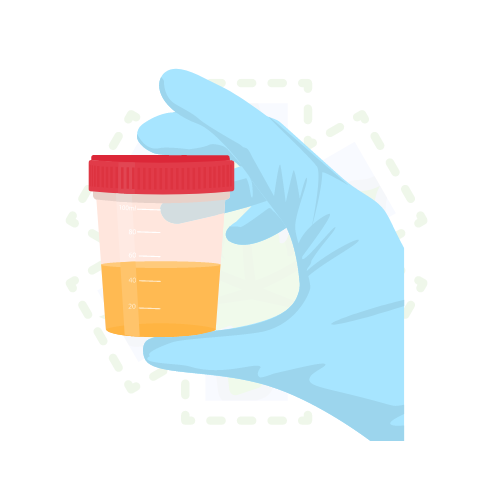
Urine tests are the most common method for detecting cannabinoids.
These tests don’t actually look for THCA itself, but for THC-COOH, a metabolite produced when your body processes THC. It’s like looking for fingerprints at a crime scene – you’re not catching the culprit in the act, but you’re finding evidence they were there.
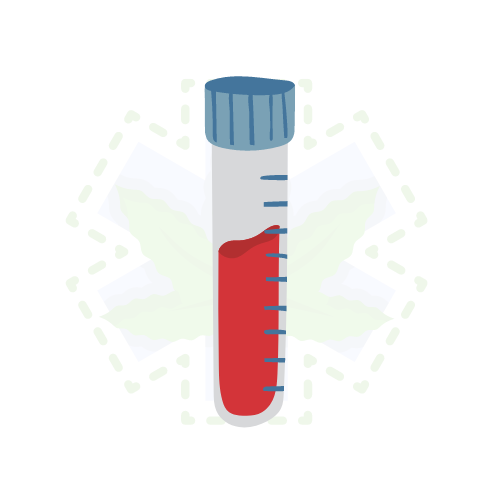
Blood tests are less common, but they can detect both THCA and THC. They’re like the bloodhounds of drug tests – more precise, but also more invasive.
These tests can show active use, which means they can tell if you’ve consumed cannabis recently. It’s like catching someone with their hand in the cookie jar. Whereas urine tests can only let you know if a few cookies are missing from the jar, but you don’t know when the cookies were taken.

Hair follicle tests are the marathon runners of drug tests. They can detect cannabis use for up to 90 days after consumption.
These tests look for THC metabolites that get deposited in the hair shaft. It’s like tree rings – your hair can tell a story about your cannabis use over time.
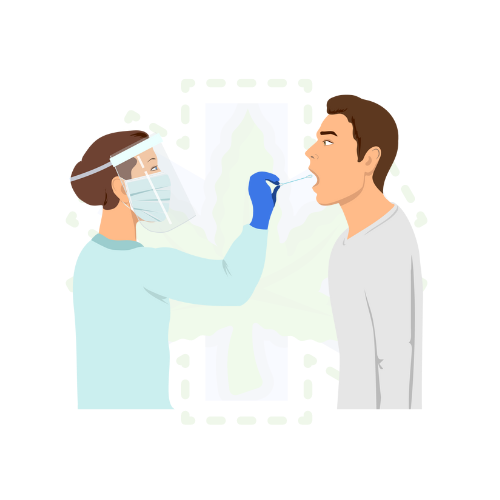
Saliva tests are becoming more popular, especially for roadside testing.
These tests can detect recent use of cannabis, just like blood tests, usually within the past 24-72 hours. Unlike blood tests, saliva tests are quick and non-invasive, similar in purpose as a breathalyzer for alcohol. They’re looking for active THC, not THCA, but it’s worth knowing about them.
Let’s dive deeper into what affects how long THCA sticks around in your system.
If you’re a frequent flyer in the cannabis world, THCA (and its metabolites) might stick around longer. It’s like building up frequent flyer miles – the more you use, the more it accumulates.
Occasional users might clear THCA from their system faster. It’s like the difference between a stay-cation and a world tour – one leaves traces for longer than the other.
The amount of THCA you consume and how potent it is can affect how long it stays in your system. It’s like the difference between a light sprinkle and a downpour – more THCA means it might stick around longer.
Everyone’s body is different, and that includes how we process THCA. Some people have metabolisms that are like high-speed blenders, processing THCA quickly. Others are more like slow cookers, taking their time.
Your metabolism can be influenced by factors like age, genetics, and overall health. It’s like having a unique fingerprint for how your body handles THCA.
Your body composition can affect how long THCA stays in your system. THC metabolites are fat-soluble, which means they can hang out in fat cells for a while.
If you have a higher percentage of body fat, THCA metabolites might stick around longer. It’s like having more hiding spots for the THCA to play hide and seek.
Now, let’s address the elephant in the room – drug testing.
There’s a lot of misinformation out there about THCA and drug tests. Some people think that because THCA isn’t psychoactive, it won’t show up on drug tests.
But here’s the thing – most drug tests aren’t looking for THCA specifically. They’re looking for THC metabolites. And remember, THCA can convert to THC in your body.
It’s like trying to sneak a cat into a “no dogs allowed” apartment. Sure, it’s not a dog, but it’s still not allowed.
While it’s rare, false positives can happen with cannabis testing. This is more likely with THC than THCA, but it’s worth knowing about.
Certain medications, foods, or other factors can sometimes cause a false positive.
So, what if you want to speed up the process of getting THCA out of your system?
The most reliable method is also the simplest – time. Your body is pretty good at cleaning itself out. Eventually. Like I said earlier, the more often you use cannabis, the longer it will take for THCA to flush out of your system.
Drinking plenty of water and eating a healthy diet can support your body’s natural detox processes. It’s like giving your internal cleaning crew the best tools for the job.
Foods high in fiber can help speed things along, if you catch my drift. It’s like a waterslide for toxins – wheee!
Exercise can potentially help speed up THCA elimination by burning fat cells where THC metabolites are stored. It’s like spring cleaning for your body.
But be careful – exercise right before a drug test might actually increase the concentration of THC metabolites in your urine. It’s a bit of a double-edged sword.
Let’s talk about the serious stuff – the legal side of THCA.
Many workplaces have policies about drug use, including cannabis. It’s important to know your company’s stance.
Some places don’t care what you do in your free time, as long as you’re not impaired at work. Others have zero-tolerance policies. Every workplace is different.
The legal status of THCA is… complicated. In some places, it’s treated the same as THC. In others, THCA derived from hemp might be considered legal.
It’s like a patchwork quilt of laws across the country. Always check your local regulations before using any cannabis products.
As we wrap up, remember that knowledge is power. Understanding how THCA works in your body can help you make informed decisions about its use.
Whether you’re using THCA for potential therapeutic benefits or you’re just cannabis curious, it’s important to know how it might affect you and how long it might stick around.
Stay informed, stay safe, and remember – when in doubt, ask a professional!
THCA itself isn’t typically tested for in urine. However, its metabolites can be detected for about 3-30 days, depending on frequency of use and other factors.
While THCA isn’t psychoactive, it can convert to THC in your body. Most drug tests look for THC metabolites, so consuming THCA could potentially lead to a positive test result.
The legal status of THCA varies by location. In some places, it’s treated the same as THC, while in others, THCA derived from hemp might be considered legal. Always check your local laws.
The most reliable method is time. Staying hydrated, eating a healthy diet, and exercising can support your body’s natural detox processes, but there’s no guaranteed way to speed up THCA elimination.
Most standard drug tests don’t differentiate between THCA and THC. They typically look for THC metabolites, which can result from both THCA and THC consumption.
It’s unlikely that second-hand exposure to THCA would result in a positive drug test. However, exposure to heated cannabis (which converts THCA to THC) could potentially affect test results in extreme cases.

Explore this cbd consumption methods tutorial and follow the step-by-step process to select, use, and verify the safest ways to consume CBD for wellness.
Read More
Learn what CBD edibles are, their main types, expected effects, legal status, safety factors, and how they compare to other forms of CBD.
Read More
Therapeutic Uses of CBD Managing Chronic Pain with CBD Struggling with chronic pain? CBD might help. Studies suggest it can reduce inflammation and alleviate discomfort,...
Read More
Just as CBD may help humans due to its interaction with the body’s endocannabinoid system, the same is true of dogs. CBD has the potential...
Read More
Cannabis has been used for millennia to treat numerous health conditions. Current research offers promising results on the effects of CBD oil on breast cancer.
Read More
What Is CBD for Cats? CBD (Cannabidiol) is a natural compound from hemp. It’s non-psychoactive, meaning your cat won’t get “high.” Instead, it works with...
Read More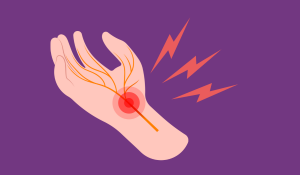
1. Understanding Neuropathic Pain Neuropathic pain results from nerve damage or dysfunction, causing symptoms like burning, tingling, or sharp shooting pains. Common Causes: Symptoms Include:...
Read More
CBD for Pets: A Pet Parent’s Guide to Dosage We all want the best for our pets, especially when they’re struggling with pain, anxiety, or...
Read More
What Is Lupus? Lupus is a long-term autoimmune condition that can impact multiple organs, including the skin, heart, lungs, and kidneys. The most common type...
Read More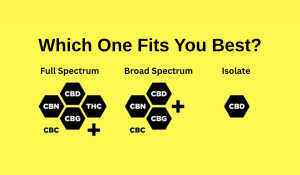
1. Full-Spectrum CBD: The All-In-One Option What it is: Contains CBD, minor cannabinoids, terpenes, flavonoids — and less than 0.3% THC. Why choose it: Promotes...
Read More